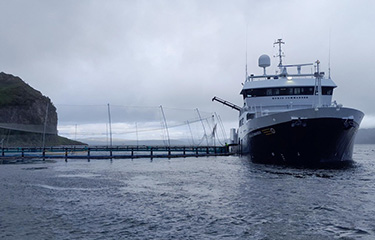Mowi Scotland has appealed a recent refusal of its proposal to expand its Loch Hourn farm in Scotland, citing a lack of fact-based reasons to refuse the expansion.
Mowi’s proposal called for an increase in the production capacity of the farm from a limitation of 2,500 metric tons (MT) of production to 2,750 MT – a 10 percent increase in salmon production that the company would farm in fewer, larger pens.
The Loch Hourn salmon farm was recently upgraded the larger pens and currently hosts seven 160-meter circumference pens stocked with juvenile salmon in line with the planning authority’s limitation of 2,500 metric tons (MT) of production.
The company said it has found a number of benefits from using the new pens, including operational efficiencies.
“As we outlined in our planning application, the benefits of fewer, larger pens are evident and include reduced visual impacts, operational efficiencies, reduced fish-stocking densities, and improved health and welfare for our salmon,” Mowi Scotland Head of Environment Stephen MacIntyre said.
However, Mowi’s application to farm more salmon was first rejected in June 2022 by The Highland Council, which represent the Scottish Highlands in northern Scotland. The Press and Journal reported that Councilor Richard Gale led the motion to refuse permission fo the farm's expansion. At the root of the refusal was a lengthy debate from the public, which lodged 159 objections and 56 supporting comments regarding the proposal to expand. The press reported that public comments voiced concerns ranging from a potential increase in sea lice, waste feed, and feces in the loch, with potential negative impacts on marine life in the region.
Negative comments included in the Highland Council planning report ranged a wide array of topics, including worries that the “beautiful scenery will be harmed,” that the farm will have a negative impact on tourism in the region, and general comments that “salmon farming is not sustainable” and that traffic would be made worse. There were also fears that the farm would negatively impact other species in the region, including “increased negative impact on oysters, blue mussels, horse mussels, and freshwater pearl mussels.”
Councilor Gale, according to the local press, appeared to echo some of the fears included in the comments.
“I feel that we have a duty to protect the natural environment and the various species that exist in the area,” Gale told the Press and Journal after the meeting. “I didn’t feel that there was enough reassurance from this particular application to confirm that we could guarantee that level of protection.”
However, according to Mowi, those fears weren’t based on the realities of the proposal.
“After careful consideration, we have concluded there are strong evidence-based grounds to contest the reasons for refusal and, in accordance with the statutory provision, we intend to appeal against the decision,” MacIntyre said. “In this appeal, we present clear evidence and information showing why we believe the decision to refuse planning permission was not consistent with development plan policy nor a proper assessment of the application and environmental impact assessment report.”
Mowi said the Scottish Environmental Protection Agency’s (SEPA) assessment of the risk to protected species and seabed habitats posed by the application concluded it would not pose any significant risk. As such, it issued a varied controlled activities regulations license. At the same time, the initial planning permission was recommended for approval by Highland Council planners and received no objections from statutory agencies.
The Highland Council’s own planning report also mentioned that consultation with Marine Scotland Science found that the stocking density is acceptable, the submitted environmental management plan met all criteria, and that “improved sea license management techniques and strategies should mitigate any impact from greater biomass.”
The Highland Council planning report cautioned that many of the comments regarding the salmon farm had nothing to do with the additional biomass, and were about the farm itself. Mowi had already reduced its proposed biomass from 3,100 MT to 2,750 MT, according to the plan, as it had felt it would be “more likely to gain SEPA approval” thanks to empirical evidence it presented from its previous production cycle.
During Scotland's emergency COVID-19 regulatory relaxation, the report states, the farm was already running at 2,750 MT of capacity – with no apparent negative impacts. Additionally, the planning report said a rejection of the application won’t remove the salmon farm – and that most of the concerns regarding appearance are irrelevant as a result.
“A number of the objection representations received make observations with reference on fish farming in general and the suitability of this site itself,” the report said. “However, refusal of this application will still leave the existing farm with planning permission to continue to operate as before.”
McIntyre said the company recognizes the mixed reaction to the proposed expansion, but that the company expects the council to use “evidence-based” reasoning on similar applications.
“We acknowledge that the planning application resulted in a mix of positive and negative feedback from local residents about the farm that has been operating near the Arnisdale community for the past 30 years," McIntyre said. "Notwithstanding, we expect that development decisions that affect the livelihoods of many local families be evidence-based when considering social, economic, and environmental sustainability."
Photo courtesy of Mowi Scotland







